A few months back, Honda Motorcycle & Scooter India Pvt Ltd launched the H’ness CB350 in our market to rival the likes of Royal Enfield Meteor 350. As soon as Honda introduced the H’ness CB350 in India, it attracted a lot of enthusiasts across the country. Last week, we got a chance to ride the new Honda CB350RS, which is the Scrambler version of the H’ness. Among other things, the bikemaker has made subtle cosmetic changes in the new CB350RS to make it look more rugged. We rode the new Honda scrambler in the city and on the highway to test its overall performance in different situations. So, here’s our road test review of the 2021 Honda CB350RS.
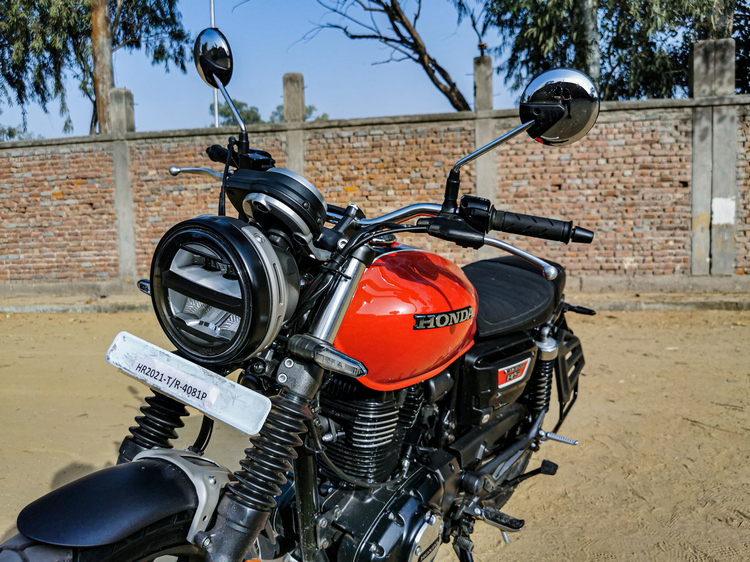
Honda CB350RS- Styling & Features
One of the main aspects in this review is the design of the motorcycle as this is an important area where RS primarily stands out from the H’ness. The bikemaker has made these cosmetic changes to make the new Honda bike look a tad bolder. One can see that the front-end of the bike gets a rugged-looking mudguard and sleek LED side blinkers, which are inspired by the one offered in Honda Hornet 2.0.
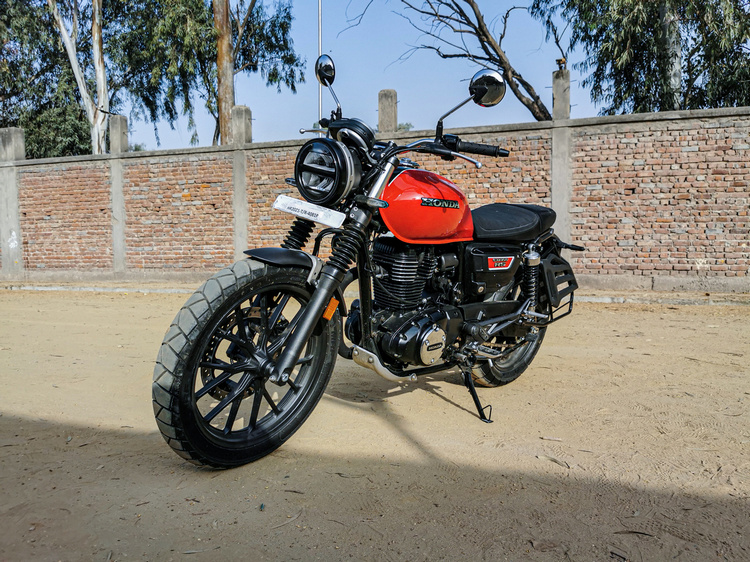
Other than this, it gets regular LED headlamps, which are also offered in the H’ness CB350. The motorcycle gets sporty-looking blacked-out multi-spoke 19-inch and 17-inch rims at the front and rear. The alloy units are wrapped with dual-purpose tyres from MRF. Moreover, Honda H’ness uses a lot of chrome inserts, which make the bike look quite premium, while on the CB350RS these parts have been blacked-out, which looks sporty.
Also, the bike gets a metal bash plate that protects the engine bay from small pebbles and stones. We are quite impressed with the red colour scheme of the bike, and also the retro-style badging on the tank. Also, one can find the CB350RS badging on the top of the tank as well as on the side panels. On the side, the bike employs a blacked-out exhaust with a chrome guard. It also features a new wide seat, which is pretty comfortable, and a person can effortlessly do everyday commutes and long trips. But riding this bike with a pillion would be difficult as the pillion seat is not that wide. As compared to the H’ness CB350, the rear-end of CB350RS is all-new as it looks sporty. The rear fascia of the bike consists of a sleek-looking LED taillight and side blinkers. Overall the bike looks very sporty, and it will surely attract a lot of youngsters towards itself.
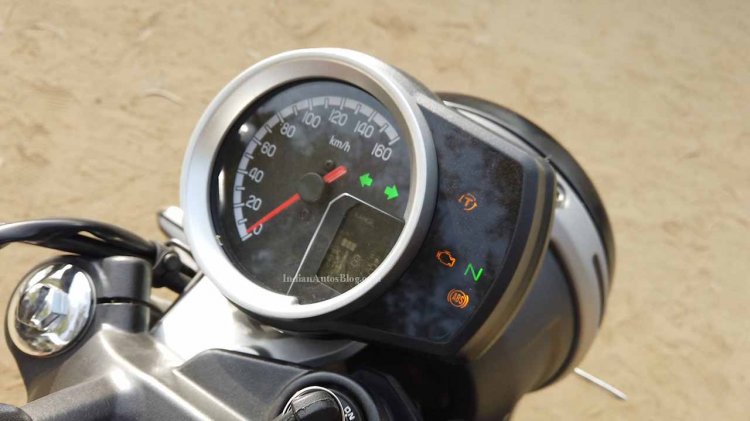
Like Honda H’ness CB350, you get a semi-digital instrument cluster with the CB350RS, which features an analogue speedometer on the left and a small digital display on the right, which provides fuel gauge, trip meters, time, gear position indicator and so on. The motorcycle misses on features like smartphone connectivity options and a USB charging port. You get these features in the H’ness CB350, but we expect Honda to introduce these advanced features in CB350RS in the near future.
Honda CB350RS- Engine & Performance
Talking about its mechanical specs, the Honda CB350RS is powered by a 350cc, single-cylinder air-cooled mill, which develops 20.8bhp of power and 30 Nm of twisting force. The engine comes paired with a 5-speed MT. This is the same power plant, which is propelling the H’ness CB350. In terms of performance, the engine offers a punchy low-end and mid-range, but it tends to lose out its steam as soon as it reaches the top-end. The motor comes into its character after crossing the 3,000rpm mark. The top speed of the motorcycle is 125kmph and one can easily cruise on the highway at triple-digit speeds.
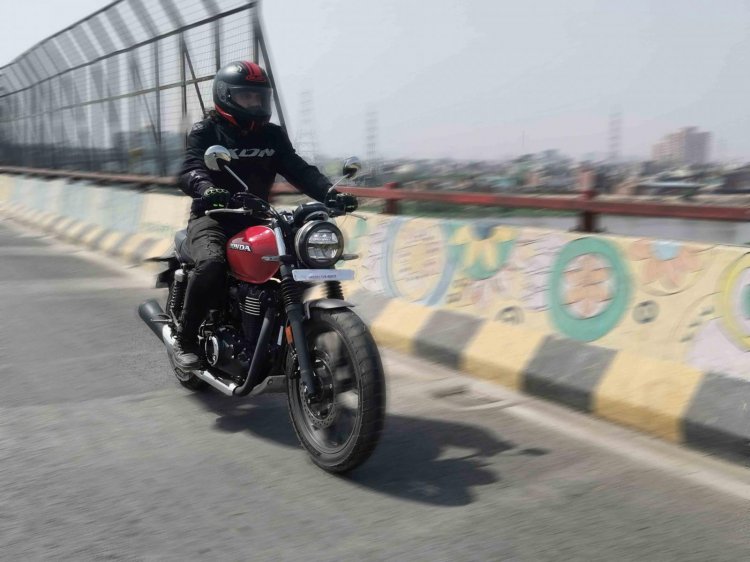
A rider can feel the vibrations coming via handlebars and footpegs as soon as it crosses the 75-80kmph mark, but these vibrations won’t annoy you much if you are riding it at higher speeds. The motorcycle feels powerful while riding in the city and on highways because it offers a good amount of low-end torque. The 5-speed gearbox has been tuned well. The 1st and 2nd gear feels quite clunky, but the 3rd, 4th, 5th gear are pretty smooth to shift. The gearbox comes paired with a slipper & assist clutch via which a rider can easily shift the gears without using the clutch lever. It also gets Honda’s HSTC (Honda Selectable Torque Control), which aspire a lot of confidence, while riding it on loose or wet surfaces.
Honda CB350RS- Ride & Handling
The riding posture of the new Honda CB350RS is quite comfortable that one can easily ride this bike in the city without putting too much pressure on his/her spine. As compared to the H’ness CB350, the footpegs of this motorcycle are slightly rear-set, and the handlebars are front-set, which gives the bike an aggressive riding posture. The Honda CB350RS also gets H’ness like compact handlebar, which makes it quite easy to cut this motorcycle via city traffic. The positioning of the side mirrors could have been better because while riding you will see your forearms more than the traffic coming from behind.
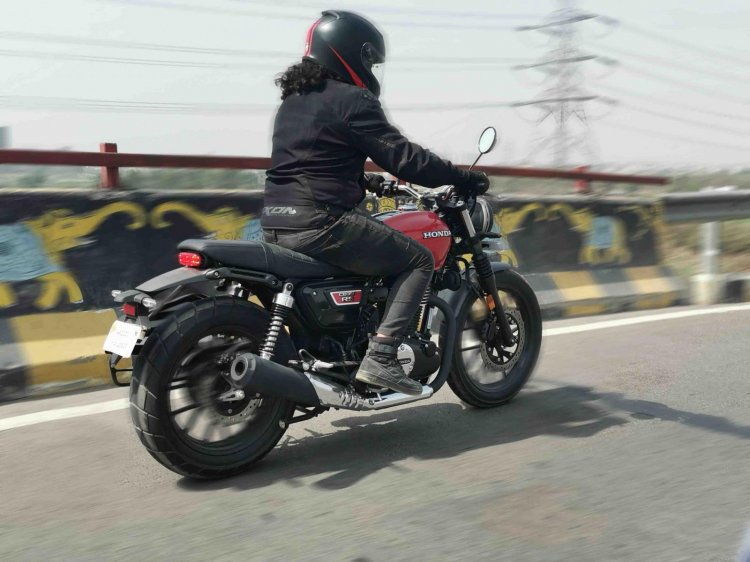
You get a 310mm disc brake up front and a 240 mm disc brake at the rear by Nissin, which is assisted by a dual-channel ABS. The braking system offers an amazing amount of feedback under hard braking. It rolls on dual-purpose tyres by MRF, which offers a decent amount of on-road and off-road performance. Talking about its suspension system, upfront it gets telescopic forks and springs at the back. The suspension tuning has been tuned well as it effortlessly counters speed breakers and potholes.
Honda CB350RS- Verdict
The Honda CB350RS is offered in two different trim levels namely- Monotone and Dual Tone. The only difference between both models is the colour shades. The former is retailed at Rs 1.96 lakh (ex-showroom, Delhi), while the latter carries a price tag of Rs 1.98 lakh (ex-showroom, Delhi).
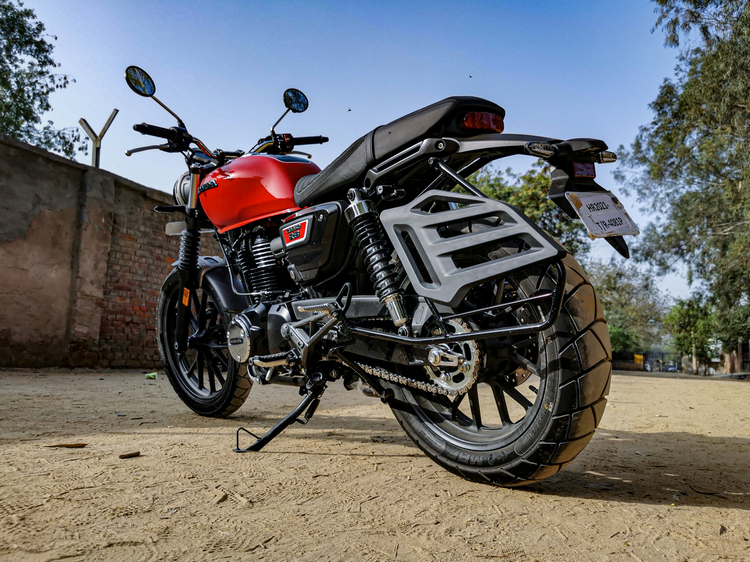
As compared to the Honda H’ness CB350, the CB350RS is around Rs 3,000 costlier. Furthermore, this motorcycle lacks a few features like smartphone connectivity options and a phone charging port, which are offered with H’ness CB350. However, this motorcycle looks amazing, and it will surely attract a lot of young buyers because of its more masculine looks. Basically, the 350RS makes tremendous sense if you need most of the virtues of the H’ness in a typical Scrambler hardware.
[“source=indianautosblog”]





